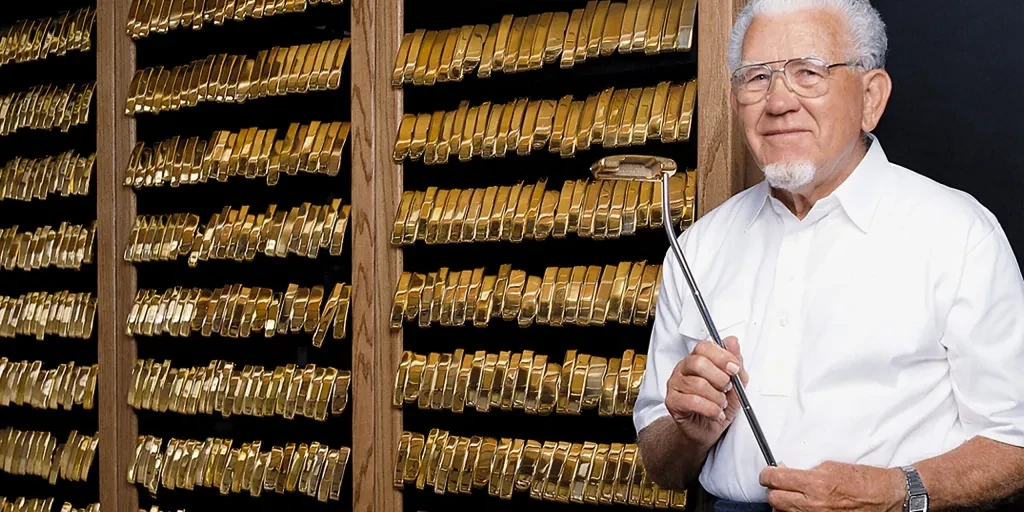CATEGORIES
- Latest News
- Interviews
- Golf Travel
- Features
- Juniors
- Competition
- Events
- Health
- Equipment
- Fashion
- Archive
INFORMATION
CURRENT ISSUE

SUBSCRIPTIONS




They’re the kind of statistics that make the ongoing success of the family-run PING golf brand a modern marvel.
The company – now so ubiquitous in golfing circles – was founded by Norwegian immigrant and car engineer Karsten Solheim in 1959 when he began shaping putters in his garage in Redwood City south of San Francisco. His son, John Solheim, took over in 1995. And in 2016, his grandson was handed the reins when John K. Solheim became company president.
But there’s an additional element to the company’s longevity that is unusual in an industry dominated by men and publicly traded companies
and that is the impact of PING’s support for women.

Louise & Karsten Solheim
“Karsten founded PING – but his wife, my great-grandma Louise, was involved behind the scenes and I don’t think a tonne of people know that,” fourth-generation Solheim, Jenna, tells Women’s Golf Magazine.
“PING would not have been a success if it wasn’t for her. Having a strong matriarch in the family has really impacted everyone trickling down throughout the business. It’s why PING has always supported women in sport. They saw a need and they were willing to meet that.”
Karsten Solheim walked the talk when it came to supporting women in golf. In 1990, he put his name and chequebook behind the women’s version of the Ryder Cup. The event was dubbed the Solheim Cup and is now the biggest event in women’s professional golf. The family supports the cup to this day, and sponsors more than 30 professional LPGA golfers.

The Solheim Cup
PING was also the first golf club manufacturer to offer custom fitting to players, beginning in about 1980. This revolutionised the game for women – who previously had to adapt their swing to male-focused designs. It’s a key area in which the company continues to work.
“The tendency is to clearly distinguish men’s clubs versus women’s clubs,” says PING Director of Engineering Operations, Rose Fielder.
“Many designs assume women swing slower than men, but that’s not always the case. I might swing faster than 20 percent of the guys out there.
“As we see the marketplace and demographic shifting with more young women taking up golf, we are asking: should we be looking at women as a distinct category? Or should we say, we’re going to wipe that out and just offer a range of products for different swing speeds?”
.png)
In the age of portfolio careers, Fielder is another anomaly in the PING story. She has worked at the same company for 17 years. She scored her first internship at PING while on summer break from studying engineering and playing golf at the University of Michigan, and never left.
Now, Fielder is on a mission to hire and promote more women into the company ranks, particularly in engineering. She pioneered PING’s partnership with Fore Hire, a company that exposes women in golf to job opportunities they otherwise wouldn’t hear about.
“We’re trying to become more balanced – hiring qualified candidates of course, but all things being equal, trying to achieve more diversity,” Fielder says.
“The only downside is I don’t get a women’s bathroom all to myself anymore!”

Rose Fielder
One of the women Fielder may have to share the bathroom with is Jenna Solheim. She’s currently playing on the Oklahoma State University women’s golf team, the “Cowgirls”, and has been interning in the family business over summer breaks. The team’s home course is Karsten Creek – named after Jenna’s great-grandfather – and she recently shot 79 in a practice tournament, her best score yet.
Jenna grew up thinking it was totally normal for families to keep secret rooms full of gold putters, like PING’s famous gold putter vault at the headquarters in Phoenix, Arizona. And just like every new Solheim in the family, Jenna received a “baby putter” made to measure the length of her body when she was born.
“So, I have basically had a putter since I was born,” she laughs.
As a PING intern, Jenna loved working on the company’s social media accounts and even convinced her dad to let her start a PING TikTok page. She will graduate with a Master of Business Administration in 2024, adding to her undergraduate degree in marketing and management, and has her eye on the social media job. But while there may be gold putters, there are no silver spoons given out at PING. Jenna doesn’t expect any special treatment.

Jenna Solheim
“I love golf, but I don’t play at a level to play professionally. So, I do want to work in the family business,” she says.
“I feel like I’m more passionate about what I want to do because I’m contributing to something bigger. When I go to work, I’m not just working for a company’s profit. At the end of the day, I’m working to add to my family’s legacy, and PING is really a family.”